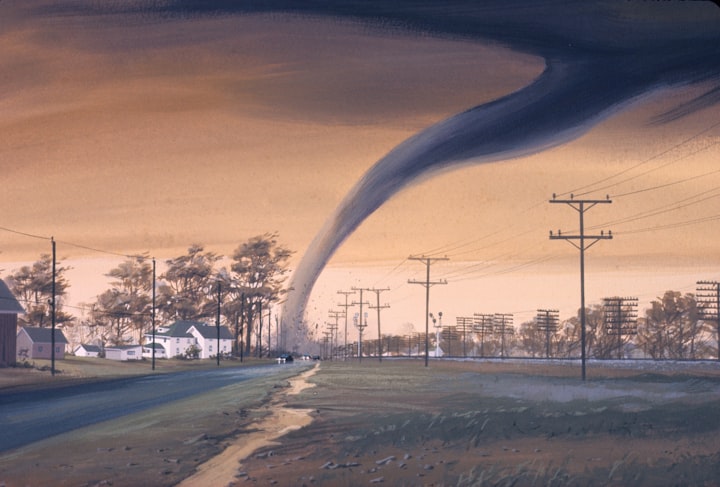Writing Gives Me Strength to Survive Pain
Write to manage difficult situations
The morning sky shined bright as a warm breeze brushed my arm. Every sign of nature forecasted a day of potential until we answered the phone call and were told Kari, our daughter, laid in the hospital unconscious following a stroke. Like a tornado that touches down unexpectedly, her stroke tore our lives up from the roots. While sitting beside her bed, I did what I always did when challenges made no sense and left me devasted. I wrote.
Writing and reading are my passions. Reading the written word conveys me to new worlds, introduces me to new characters, answers questions, and inspires me to reach goals. Writing provides comfort by prompting reflections of life events. It was only natural the day after my Kari’s stroke that I started writing in a journal. For me, writing is cathartic.
Both during the process of writing and when I reread the words on the page, I learn from the recorded events. Writing is like throwing away garage because it provides an outlet to dump pain, puke emotions. It provides an outlet to dispose of emotions that have the power to control logic leaving the opportunity to start fresh, allowing forward movement. Sure, problems still exist but without the clutter I can focus. I can acknowledge emotions but when I close the cover of my journal, there is a shield to protect my vulnerability.
Journaling works as a coping mechanism. Needless to say, I didn’t manage life very well after Kari's brain trauma. Sometimes when sleeping, I jolt awake by flashes of painful memories, thoughts that make sleep unattainable. While sitting at the keyboard and writing, I gained control of my feelings. This strategy allows the thoughts and emotions to reside on paper instead of wasting space in my mind and heart.
Often, I remain ignorant of my emotions until I read my words. The words on the first few pages of the journal, I wrote for me. I recorded my confusion, my anger, my sadness, and grief. As with most journals, I never intended to share the contents with others, but over time, it became more than the manifestation of my reactions.
The notebook with highlights, scribbles in the margin, dogeared pages, and bulges where extra pages were folded and tucked became a record of events. Life was an oxymoron as time moved at a snail’s pace as we waited on news from the doctors. However, people entered and exited the room, tests were issued, numerous expectations and hypothesis continuously were stated, changed, revised and reevaluated creating the sensation of a tornado touching down quickly to upheaval our days. Life demanded we endure sudden changes that gave us mental whiplash like riding a rollercoaster without padding, brace, or protective gear.
As doctor’s reports updated information about Kari’s condition, I wrote it down. Over time it became necessary to cross reference information to remember facts accurately. There even came a time when the journal provided confidence to challenge decisions because of conflicting opinions. With numerous personalities invested in Kari’s recovery, sometimes theories about best practices conflicted. The journal notes provided guidance to ease the confusion. Lists filled both sides of pages: names of medicines, dosages, vital statistics, doctor’s names, when they visited and when they planned to return.
As a teacher, I often said, “If it is not documented, it didn’t happen.” Document, document, document is a common refrain in the field of education. As a professional, I learned words hold power to inform, remind, teach, and inspire. My mind blurred as one day ran into another, so the journal became a point of reference. It substituted for a brain when mine stopped functioning under the stress. The words in my journal helped me find answers when they hid in the cobwebs of my mind.
To keep everyone informed about events, we started a webpage on a site called Caring Bridge. Each afternoon while Kari slept, I used notes from the journal to update loved ones about Kari’s progress. The first two entries I share below.
October 2 — Day 3
As most of you know, Kari had a stroke late Saturday night. She is in ICU at St. Luke’s Boise. Many tests need to be administered before a plan of action is determined. And due to the sensitive area of her brain that is damaged the recovery will be slow.
Kari has had a couple of positive events. This morning with the help of two therapists, she stood at the bedside for a moment. She has little use of her right side and limited ability to talk. Each day she says sometimes new. Today when asked, she said her name, Jodi and Eliza. She even spelled Eliza’s name.
Kari likes to have her back and shoulders rubbed. A wet cloth on her head is soothing. Today she said cold when the cloth was placed on her forehead.
October 3, Day 4
Kari had an angiogram last night. They were unable to determine as yet the cause of the stroke. The blood clot has stopped bleeding but is covering an area in her brain that makes it impossible to tell what might be under or beneath the clot. Therefore, there are many unknowns. It will take several months for the blood clot to absorb into the brain and then more information may be available. They are planning on having an MRI today some time.
Progress is slow but there is progress. She is smiling and with some gestures can sometimes communicate when she wants something. She can’t move her right arm but can raise her right leg slightly. She is a stubborn lady as many of you know so we are optimistic that improvements will continue.
We cannot begin to thank everyone for the gifts of love and support that are pouring out. We are blessed to be a part of this family and community.
Even if a person does not consider themselves a writer, the value of a notebook to hold information would prove invaluable and benefit any caretaker in a similar situation. Because we rotated shifts to sit beside Kari’s bed, the notes became a means to communicate the most recent news to incoming loved ones. When exhaustion inhibited legible dialogue and erased recent memories, the journal provided needed support.
Unexpectedly, months later, the journal continued to be a source of knowledge. It became a written document on Kari’s journey. The words on the pages answered many questions that needed responses. Because questions and answers also filled the pages, I found myself using the source often.
The words also provided evidence of growth. Fear invaded my mind and caused me to doubt that her health was improving. When Kari tired quickly, the excerpt detailing how she couldn’t sit up in bed the first few days, reminded me of her success. If watching Kari eat with her left-hand produced anguish, notes provided reminders of when her right side was totally paralyzed. After a year and words remained difficult, reading through her therapies, and remembering when she couldn’t provide the names of her daughters gave hope. By reading where our daughter began and following her progression, we celebrated her healing instead of lamenting her losses.
Once Kari went home, the journal offered a review of rehab strategies because these also made their way onto the page. I even made simple sketches of how position her body, hold her arms, and lift her leg. The pages became an invaluable resource.
I feel blessed to be able read about Kari’s success because they are inspiring. Sure, sometimes the pain reemerges, but honestly, that would happen no matter the situation. Grief is unavoidable when someone you love hurts. However, after a storm emerges a rainbow. The words on the pages allowed the beautiful colors to shine through the clouds.
About the Creator
Brenda Mahler
Travel
Writing Lessons
Memoirs
Poetry
Books AVAILABLE ON AMAZON.
* Lockers Speak: Voices from America's Youth
* Understanding the Power Not Yet shares Kari’s story following a stroke at 33.
* Live a Satisfying Life By Doing it Doggy Style explains how humans can life to the fullest.







Comments
There are no comments for this story
Be the first to respond and start the conversation.